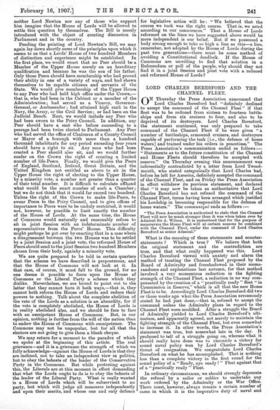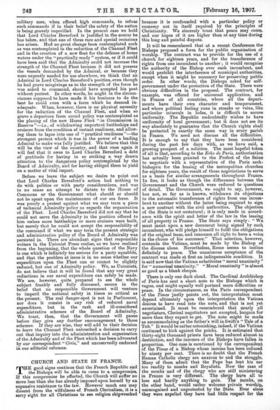LORD CHARLES BERESFORD AND THE CHANNEL FLEET.
ON Thursday the Press Association announced that Lord Charles Beresford had "definitely declined to accept the command of the Channel Fleet" if that fleet was to be reduced from sixteen to fourteen battle- ships and from six cruisers to four, and also to be deprived of its destroyers. Lord Charles Beresford, the statement continued, was only prepared to take command of the Channel Fleet if he were given "a number of battleships, armoured cruisers, and destroyers capable of performing the task [i.e., the defence of home waters] and trained under his orders in peacetime." The Press Association's communication ended as follows :— " Statements as to the future constitution of the Channel and Home Fleets should therefore be accepted with reserve." On Thursday evening this announcement was inferentially contradicted by a letter from Lord Tweed- mouth, who stated categorically that Lord Charles had, before he left for America, definitely accepted the command of the Channel Fleet, and on Friday the Press Association in effect withdrew its previous statement, and declared that "it may now be taken as authoritative that Lord Charles Beresford has not refused the command of the Channel Fleet, terms having been arranged which justified his Lordship in becoming responsible for the defence of home waters." The communique' ends as follows :—
"The Press Association is authorised to state that the Channel Fleet will now be much stronger than it was when taken over by Admiral Sir A. Wilson. It is understood that for the purpose of manceuvres the Home Fleet will at certain seasons be combined with the Channel Fleet, under the command of Lord Charles Beresford as senior Admiral."
What is the meaning of these statements and counter- statements P Which is true ? We believe that both the original statement and the contradiction are true, and that what really happened was this. Lord Charles Beresford viewed with anxiety and alarm the method of treating the Channel Fleet proposed by the Board of Admiralty and foreshadowed in their memo- randums and explanations last autumn, for that method involved a, very momentous reduction in the fighting strength of the Channel Fleet, a reduction in no way coin-, pensated by the creation of a "practically ready" fleet "in Commission in Reserve," which is all that the new Home Fleet is to be. Accordingly Lord Charles Beresford did two or three weeks ago what the Press Association erroneously stated he had just done,—that is, refused to accept the command unless the Admiralty plans in regard to the Channel Fleet were modified. After a struggle the Board of Admiralty yielded to Lord Charles Beresford's ulti- matum, and apparently agreed, not merely to maintain the fighting strength of the Channel Fleet, but even somewhat to increase it. In other words, the Press Association's, statement was true, but somewhat late in the day. It professed to tell of a struggle going on, whereas what it should really have done was to chronicle a victory for sound naval policy won by Lord Charles Beresford'a threat of resignation. We congratulate Lord Charles Beresford on what he has accomplished. That is nothing less than a complete victory in the first round for the sound policy of a "Ready, aye ready ! " Fleet against that of a "practically ready" Fleet.
In ordinary circumstances, we should strongly deprecate the refusal by a sailor or soldier to undertake any work ordered by the Admiralty or the War Office. There must, however, always remain a certain number of cases in which it is the imperative duty of naval and
military men, when offered, high commands, to refuse such commands if in their belief the safety of the nation is being gravely imperilled. In the present case we hold that Lord Charles Beresford is justified in the course he has taken, and that one of these rare and special occasions has arisen. Had no great change been contemplated such as was contemplated in the induction of the Channel Fleet and in the creation of a new fleet for the defence of home waters under the "practically ready" system, or if it could have been said that the Admiralty could not increase the strength of the Channel Fleet because it did not possess the vessels demanded by the Admiral, or because they were urgently needed for use elsewhere, we think that an Admiral in Lord Charles Beresford's position, even though he had grave misgivings as to the strength of the force he was asked to commend, should have accepted his post without protest. In other word, he ought in the circum- stances supposed to have made it his business to do the best he could even with a force which he deemed in- adequate. When, however, there is no physical necessity for the reduction of the Channel Fleet, and when so grave a departure from sound policy was contemplated as the placing of the new Home Fleet "in Commission in Reserve "—i.e., of withdrawing important battleships and cruisers from the condition of instant readiness, and allow- ing them to lapse into one of "practical readiness "—the strongest protest which it was in the power of a leading Admiral to make was fully justified. We believe that this will be the view of the country, and that once again it will feel that it owes to Lord Charles Beresford a debt of gratitude for having in so striking a way drawn attention to the dangerous policy contemplated by the Board of Admiralty, and for having obliged them to yield on a matter of vital import.
• Before we leave the subject we desire to point out that Lord Charles Beresford's action had nothing to do with politics or with party considerations, and was in no sense an attempt to dictate to the House of Commons or the Government what should or should not be spent upon the maintenance of our sea force. It was purely a protest against what we may term a piece of technical Admiralty policy as regards the organisation of the Fleet. Lord Charles Beresford did not say that he Could not serve the Admiralty in the position offered to him unless more battleships or more cruisers were built, but merely that he could not accept the responsibility of the coraniaed if what we may term the present strategic and administrative policy of the Board of Admiralty was persisted in. There are abundant signs that responsible writers iu the Unionist Press realise, as we have realised from the beginning, that the whole question of the Navy is one which is infinitely too serious for a party squabble, and that the problem at issue is in no sense whether our expenditure upon the Fleet can or cannot be slightly reduced, but one of Admiralty policy. We, as Unionists, do not believe that it will be found that any very great reductions in our naval expenditure can safely be made. We are, however, quite prepared to see the whole subject frankly and fully discussed, secure in the belief that no responsible Government will venture to imperil the national safety in times so critical as the present. The real danger-spot is not in Parliament, nor does it consist in any risk of reduced naval expenditure, but in the rash and ill-considered administrative schemes of the Board of Admiralty. We trust, then, that the Government will pause before they give any further encouragement to those schemes. If they are wise, they will add to their decision to leave the Channel Fleet untouched a decision to carry out that inquiry into the administration and organisation of the Admiralty and of the Fleet which has been advocated by our correspondent "Civic," and unreservedly endorsed in our editorial columns.







































 Previous page
Previous page